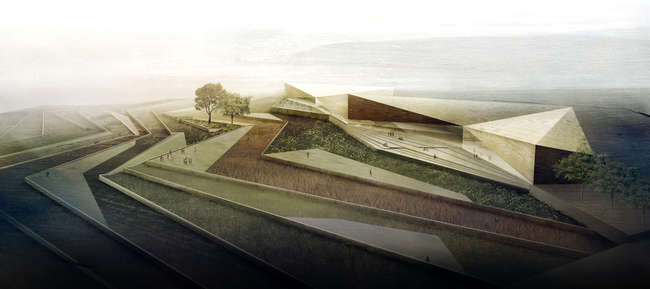Palestinian Museum Will Link the Past and the Present
Image courtesy Heneghan Peng Architects
The Palestinian Museum
Heneghan Peng Architects
Heneghan Peng Architects
A museum of Palestinian history, culture, and identity, the largest in the West Bank, is under construction following the cornerstone laying in April. The Dublin-based Heneghan Peng Architects, who also designed the Grand Egyptian Museum, were chosen in an international competition. They drew inspiration from the West Bank's landscape and are embedding the museum in a series of cascading fieldstone terraces.
Clad in local limestone, a traditional building material, the structure consists of sleek, wedge-shaped sections
Clad in local limestone, a traditional building material, the structure consists of sleek, wedge-shaped sections



The Palestinian Museum is sited on a nearly 10-acre hilltop plot donated by the adjacent Birzeit University, near Ramallah, the West Bank's largest Palestinian city. The $15 million first phase is being bankrolled by the Welfare Association, a Geneva-based nonprofit. This phase will include construction by the end of 2014 of 32,000 square feet that will include a gallery, an amphitheater, a cafeteria with outdoor seating, classrooms, offices, and service areas. The remaining 64,000 square feet, which will include a library and additional galleries, are to be built within 10 years.
The museum's goal is to "preserve and celebrate the history and cultures of modern and contemporary Palestine," going back 200 years, a spokeswoman says. This might include presenting Muslim, Christian, and Jewish "religiously oriented" perspectives on the history of the land, according to director Jack Persekian, who remains the director of the Al-Ma'mal Foundation for Contemporary Art in East Jerusalem and was the director of the Sharjah Art Foundation. The idea for the museum has been gestating since 1997. Originally it was to have been a "museum of memory" focusing on the nakba, the displacement of Palestinians as a consequence of the 1948 war, and located in Jerusalem. But the concept shifted in 2004 to make it "a hub, that will collect [and] preserve… that will use the past to inject new ideas… and will engage people in dialogue about the different issues," Persekian says. This shift is reflected in the building, which he describes as being more open and inclusive than the original design.
Paradoxically, the museum that aims to be a cultural hub for Palestinians around the world will be accessible almost exclusively to those living in Jerusalem and the West Bank. To overcome this constraint, the museum will use its website to share some exhibition content and, in its first phase, will create physical extensions in cities with large concentrations of Palestinians through partnerships with existing institutions.
Exactly what the museum will collect is still under discussion, but Persekian has decided that it will not be archaeological or anthropological. In the meantime, some exhibition material will be borrowed on a temporary basis. Regarding local sensitivities, Persekian says, "One needs to be careful…[but] one can be diplomatic and find ways to bring up taboo issues." He has no intention of "regurgitating worn-out symbols" but rather will be pushing the limits of tolerance. "I have to," he says.

The Palestinian Museum is dedicated to the exploration and understanding of the culture, history and society of Palestine and the Palestinian people. Through an innovative mix of exhibitions, research, education programmes, and cultural events, the Palestinian Museum is a place where anyone can take part in a shared conversation about the Palestinian present, past, and future. From its hub in Birzeit, with its network of local and international partnerships, and through digital platforms, the Museum will reach out to all Palestinians wherever they may live to reinforce

their common links with each other and their homeland, and to provide an opportunity to learn how varied, rich and complex the Palestinian experience has been and continues to be.
We at the Palestinian Museum welcome everyone to join us in a collective conversation about Palestinian culture, history and society.
The Palestinian Museum — Where different voices can be heard, and where every Palestinian counts.
Click here to download a pdf of our brochur
Dr. EMAD HANI ISMAEEL
Ph.D. in Technologies for the Exploitation
of the Cultural Heritage .
Senior Lecturer in the Dept. of Architecture
College of Engineering , University of Mosul
Mosul - Iraq .
E-mail: emadhanee@yahoo.com
Web Site: http://sites.google.com/site/emadhanee/
Tel : +964 (0)770 164 93 74


تعليقات
إرسال تعليق